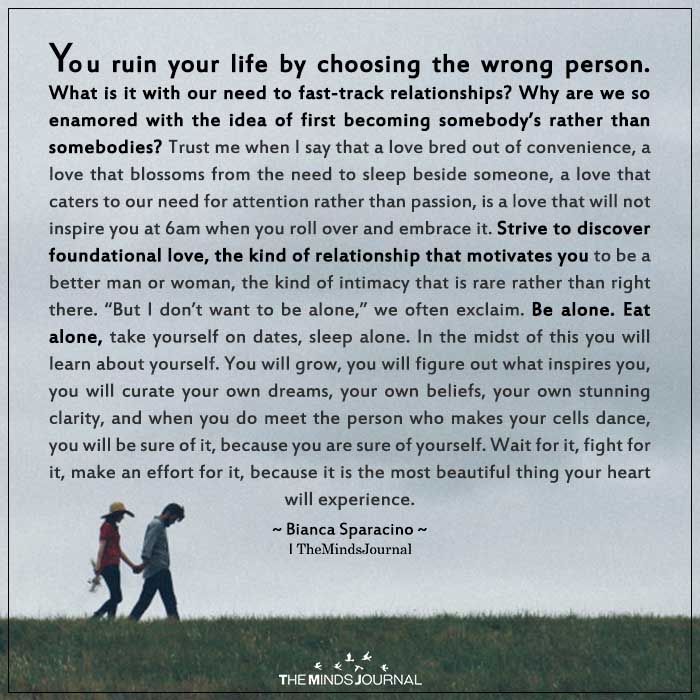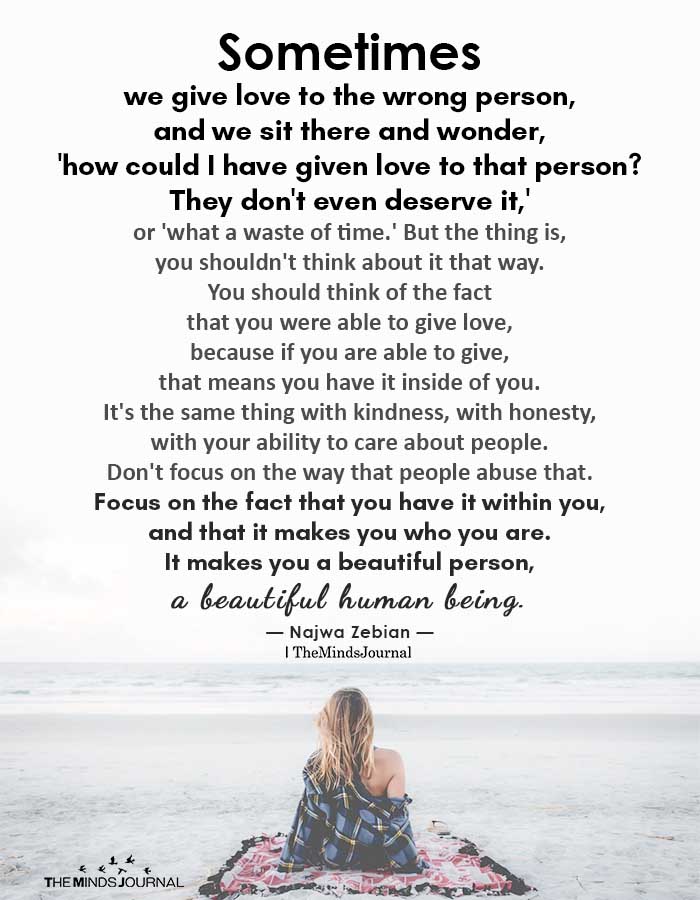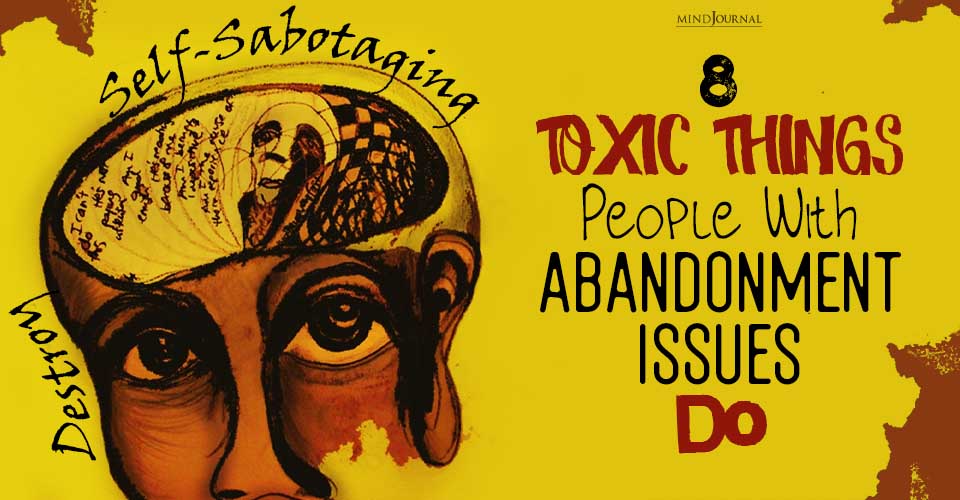5 Reasons Why You Always End Up Dating The Wrong Person
We have all dated people we knew were not right for us from the very beginning. But when it turns into a pattern and habit, then you might actually end up in a toxic relationship that may be too messed up to get out of.
Dating is often a fruitless search. Though they are filled with hopes and expectations at the beginning of each relationship, they are too often disappointing and even disillusioning in the long run.
Yet, many single people continue to put huge amounts of their time and energy into every possible option for a long-lasting partnership. Despite multiple setbacks, they keep reaching for that elusive needle in a romantic haystack. When they describe their adventures to me, I’m often amazed and so impressed at how they somehow find the resilience and optimism to keep trying. And yet they do.
The media responds by offering a smorgasbord of ready online adventures. From well-established dating sites to the plethora of ever-new ways to explore the dating market, today’s relationship seekers might easily spend many of their waking hours searching for the one person who someday will make it all worth it.
Because life has other demands, it’s becoming more necessary to predict which options are not likely to work out and to focus on those that may be more productive. Dating profiles try to help by offering carefully designed first-impression packages that help each hopeful subscriber present the most desirable picture possible. Whether they are prescribed “meet-ups” that try to take care of physical attraction drop-outs, “fix-ups” that minimize ghosting because mutual friends are often able to track someone who disappears, or chance encounters that pretty much work or don’t quite early in the connection, most relationship seekers try to use every possibility.

If so many of these honest and willing attempts to find successful romantic partnerships fail so often, what could be an underlying reason that would help ensure better odds?
In my four decades of working with singles and couples, I believe I understand what it is. My premise may not be easy to accept, but if you can courageously consider it, I truly believe that you will be much more successful in choosing the right partner in the future.
To get started, ask yourself how you would answer the following questions:
1) Have your past partners turned out to be who you thought they would?
2) Are you most often attracted to partners who are “out of reach?”
3) Are the qualities you look initially for in a partner those you need for the long haul?
4) Is it important to you that your partners impress others?
5) Is the partner you want available within your current dating options?
6) Are you being realistic in getting what you want based upon what you have to offer?
7) Are your choices more often based more on romantic myths rather than pragmatic possibilities?
If your answers to questions 1, 3, 5, and 6 are “no,” and those to 2, 4, and 7, are “yes,” you are much less likely to find success in the dating market if you continue searching the way you have in the past.
Here’s why. Humans are traders by nature. We are programmed to make deals with others. The best of those trades, of course, are those that work well for both. Sometimes they do, but often they do not.
The underlying problem is that many people believe they can make a better deal than they actually are able to. For example, they might think that what they have to offer is worth more over time than it may seem upfront, and they want the other deal-maker to trust in the investment. Or, they’ve been more sought out in a different dating market than in their current one, and haven’t accepted that reality. Maybe their well-intended friends have given them the impression that they are more marketable than they really are. Or, perhaps they’re searching in the wrong places, or it’s just the wrong time in their lives. What if they’ve just happened to move from a location where single people were more plentiful to one with sparser options? It’s even likely that some relationship seekers are simply worth more in one market than in another.
If, many single people aren’t successful because they keep searching or investing in relationships that are not likely to work out, wouldn’t that process be more likely to be successful if they were completely realistic in what they have to offer? If they know who are their likely available prospects, are authentically aware of what they need to keep loving and growing, and have done everything they can to improve their marketability, wouldn’t they have a better chance to find what they seek.
To help you understand how easy it is to be diverted from those more successful encounters, here are some common examples of typically off-the-track experiences that are not likely to develop into significant relationships.
5 Reasons Why You Always End Up Dating The Wrong Person
1. Thinking “Hot” is Better
Though it may be more applicable to the younger crowd, the external package is often a high priority for many relationship seekers. Taking good care of yourself is always a good idea, but basic attractiveness is a God-given attribute and some are just luckier than others.
Because many people put more effort into other valuable characteristics when they are not blessed with the top ten percent of physically desirable traits, they often become more attractive over time. But, if someone is only going to maintain interest if the initial package is hot, that growing appreciation may not have time to happen.
If relationship seekers realistically value their physical package as a “seven” on a one-to-ten but keep reaching for a partner who is a clear “ten,” they are going to have to come into that deal “one-down.” That means they have to constantly compensate with their other assets in order to keep that partner around, and may often find themselves contending with new rivals as others emerge who are “more attractive.”
2. Avoiding Baggage
Many relationship seekers search for a partner who is not burdened down by prior or current obligations. Debt, children, dependent family members, odd-hour jobs, educational demands, personal health problems, angry ex-spouses, on-going divorces, or even a cynical attitude, can be overwhelming for any new relationship, even if that potential partner is personally desirable.
If you are put off by a person’s baggage, you may not stick around long enough to understand and care enough to find out the good stuff that may outweigh those concerns. In the early years of dating, it is much easier to let go of a relationship that is simply too expensive.
When people are relatively confident that a better deal may be on the horizon, they are more likely to focus on the cost of a relationship rather than its assets. As options decrease and time pressures prevail, those burdens often become less ominous and the willingness to work with them may be more intriguing.
There is a caveat: Some innate “rescuers” look to be the ones who can alleviate baggage by their enthusiasm and offering of resources. Usually not a good idea.
3. Equating Financial Success with Personal Value
This often unrealistic equation took root when women were instructed to use their feminine attributes to “hook” a currently or potentially well-to-do provider. In today’s world, many women are more educated and established providers of their own comfort. Now both women and men are equally attracted to partners who are not only able to take care of themselves at the moment but have even greater potential for financial success in the future.
Unless people are endowed with family money, both women and men have to commit a great deal of time and energy to maximize their financial options. As a result, their “ascension focus” may not leave a lot of time for them to develop relationship-successful skills. If both potential partners are deep into their career development, the lack of a support system for a rising star can produce more of a competitor than a collaborative personal environment.
Couples today are trying to more equally share their resources of time, energy, and availability. Still, it can be a scary delusion if one feels that financial success automatically supersedes the personality characteristics of a great, long-time partner. Those who make financial security a top priority in their search for partners may end up materialistically richer, but emotionally poorer.
4. Counting on Change
Most relationships start out with more wonderful aspects than worrisome ones. The proportions of more intriguing and satisfying behaviors are clearly greater than those that irritate. That makes “the deal” desirable for both partners. Many new daters believe that their partner’s negative characteristics will never outweigh the positive ones.
Unfortunately, that rarely turns out to be true. The negatives of a relationship may seem proportionately smaller at the beginning of love but can wear on either partner over time, especially if they increase. Something that seems almost irrelevant in the midst of lust and romance can become a major irritation as time goes by.
Most relationships I’ve seen end with many of the positive aspects of the relationship intact, even if they have been buried by bad experiences. Both partners often can tell me exactly what attracted them to each other when they were first together. They then confess that things they thought would change, became hurdles they could not get by.
5. Believing that the Perfect Love Exists
If you know what you need to feel deeply loved in the long term, it is crucial that you do not have a rigid template of perfect love. This is especially true if you have been repeatedly disillusioned by partners who seem to be what you want early in your relationships, but always end up disappointing you in the long run.
The Perfect love is imperfect in its uniqueness and its ability to transform as life challenges. There are no pre-templates that guarantee its existence or its sustainability. But there are certain virtues that most all long-term successful intimate partners have in common. They may not have the characteristics of the perfect mate in what that means to you right now, but they wear unbelievably well over time.
Yes, there has to be some kind of attraction to any partner you choose. Yes, you want to agree on the important aspects of life’s dreams. Yes, you need to be a team, supporting each other’s commitments. And yes, you have to stay connected to your mutual dreams when times are tough.
But great long-time partners don’t only abide by those classic relationship rules. Long-term desirable partners are just good people everywhere in their lives. They are authentic, accountable, resilient, forgiving, focus on solutions rather than problems, treasure what they have, uninterested in time-wasting, repeated, negative interactions, non-possessive, supportive, un-buyable, self-caring, treasuring souls. They rock with unexpected crises, and they build when things are broken. They learn from mistakes and innovate when they are stuck.
The closer you can become to attaining those characteristics, the better chance you’ll have of attracting someone equally desirable, regardless of the odds.
The perfect love does not happen from a pre-written script that someone else has to buy in to. It is created by two people who keep deepening their love for each other as life happens.

If you try to make an up-front deal with a finished product, you may be forever limited by its initial presentation.
Written by Randi Gunther Ph.D.
Originally appeared in Randi Gunther, Ph.D.
You may also like:
- 7 Signs You’re With The Wrong Partner
- Reasons Why You Always Get Stuck With The Wrong Guy
- Why We’re Attracted To People Who Are Wrong For Us
- Save Your Love For Someone Who Deserves It
- If You Don’t Feel These 12 Things with Your Partner, It Isn’t Real, True Love










Leave a Reply